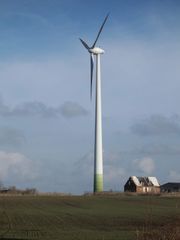Wind Blows Eco-efficiency For Ford at Dagenham
 |
BRENTWOOD, Essex, 12 July, 2007 – Ford diesel engine production at its wind-powered Dagenham plant is saving thousands of tonnes of CO 2 and diverting almost twice as much waste from landfill.
New figures from Ford's award-winning Dagenham Diesel Centre reveal that 6,500 tonnes of CO 2 a year are avoided by wind turbines installed over three years ago. Ford Dagenham's other eco-efficient processes prevented over 12,600 tonnes of waste being sent to landfill for disposal.
The Business Commitment to the Environment group had already highlighted in June Ford's environmental plan behind Dagenham's new 1.4/1.6-litre engine line with a premier award.
Ford Dagenham's eco-efficiency drive was also nominated at Business in the Community's national "Awards for Excellence 2007" gala this month, attended by former US Vice President Al Gore and BitC President the Prince of Wales.
Stuart Burn, Ford technical specialist, said: "We are delighted that our eco-efficient production at Dagenham is recognised. Not only are we minimising Dagenham's environmental impact, we are also helping the consumer. Ford Fiesta models powered by these new 1.4 and 1.6-litre engines emit under 120g CO 2/km – putting them in the £35 road tax category."
Dagenham's national eco-efficiency nomination followed regional success for the project, and other wins for Ford from Business in the Community. In its East of England awards, Ford received a further six honours for its Essex-based teams – three times that of its nearest rival.
Eco-efficient Ford Dagenham
Ford Dagenham is celebrating the start of production of economical 1.4 and 1.6-litre diesel engines. The engines' machining and assembly operation was installed with the target of achieving best-in-class environmental protection.
As Dagenham's output expands towards 1,000,000 engines a year by 2009, Ford is deploying a parallel plan to improve environmental efficiency:
Reduced gas and electricity consumption – resulting in 6,500 less tonnes of CO 2 Waste elimination and reduction –12,620 tonnes of landfill avoided 'Green' vegetable oil for metal working and other fluid actions – over 500,000 litres of mineral oil saved Ford's eco-efficiency is delivering a positive environmental impact plus a £3,400,000 annual benefit.
Energy conservation
The 1.4/1.6 assembly engine line is in Dagenham Diesel Centre, Ford's only wind-powered plant in the world, which is powered by 3.6MW capacity turbines producing over 6,000,000 kWh of renewable electricity.
Ford Dagenham's gas and electricity bills are also down, by 12 per cent, thanks to a strict focus on energy intensive operations such as the generation of compressed air for handheld tools on the production line. Such high usage equipment was scientifically optimised on Dagenham's new 1.4/1.6 line, requiring 70 per cent less energy per engine versus other manufacturing lines.
Effective waste management
The diversion of 12,620 tonnes of Ford Dagenham waste from landfill is principally divided between the recycling of dried fluids and of old concrete for the new production floor.
Metal filings and other waste from the machining process are squeezed dry of lubricants and sold on as briquettes for recycling. When Dagenham Diesel Centre was being prepared for its new 1.4/1.6 line, alongside the existing 2.7/3.6 facility, 20,000m 2 of old concrete was broken, pulverised and reused for the production hall floor.
'Green' oil
Metal-working fluids and their associated waste are potentially the most damaging environmental factors associated with engine production. Fluids used during the machining of new Dagenham-built engines are now blended from vegetable rather than mineral oil.
Because vegetable oil-based lubricants are used at reduced concentrations compared with conventional fluids, coolant consumption is down from 350,000 litres in 2003 to 204,000 litres last year. Combined oil conservation at Ford Dagenham exceeds 500,000 litres per year.
Ford top in East England too
In regional heats before BitC's national "Awards for Excellence 2007", Ford took six awards. As well as the national eco-efficiency award for Dagenham, Ford of Britain Human Resources Director, Bob Blenkinsop, was honoured for his volunteering work on behalf of anti-racism campaigners "Kick It Out".
Other awards went to Dagenham Transport Operations for community v olunteer work and their partnership with Macmillan Cancer Support; to Ford's diversity programme and to the company overall as regional Large Company of the Year.


